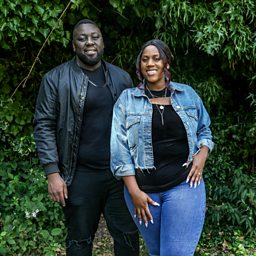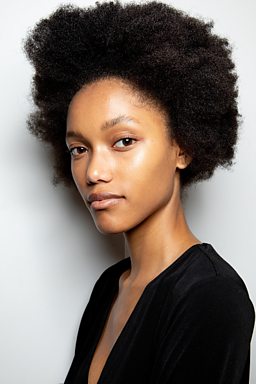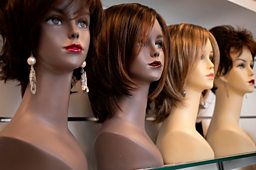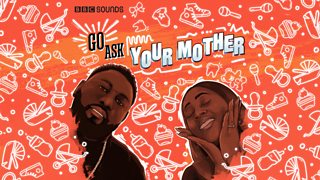How we encourage our girls to love their hair

Children’s ideas of who they are and how they see the world are formed very early. From subtle observations to the explicit reinforcements given by adults, they start learning what’s good, what’s bad, and where they fit in.
For Black girls, this can mean growing up in a world that expects less of you due to harmful stereotypes, or deems you not as beautiful as others because of generations of racist beauty standards upheld across the world.
However, parents can play a massive part in contributing to a child’s early view. Sindy Chikadaya and Vanel Abramsamadu, hosts of the Go Ask Your Mother podcast, are parents to daughters Sienna, 5, and Serena, who is 20 months. With positive representation and empowerment being a major part of their parenting, they’re determined to raise girls with pride in who they are.
For Sindy, that means making sure that Sienna doesn’t have the same hangups about her natural hair that she did at the same age and beyond.
“Once, Sienna had her hair in plaits, and they were getting a little old and messy so I said she could take them out herself,” Sindy begins. “When her hair was back in its natural ‘fro, and she came up to me and said, ‘Mummy, look at my crown! I really love my hair now!’
“I said, ‘what do you mean by now?’”
Gingerly, Sienna admitted to her mum that she’d wanted to have straight, long hair like her classmates and her dolls - a surprise to Sindy.
“I never knew she felt that way; I’ve always got her to embrace her hair. I do different styles, and I’ve always made her hair in ways she loves. We’ll plan out her hairstyles, she’s a part of the process.
“I always put my effort into making sure she felt comfortable in her skin and hair because growing up, I know I didn’t.”
Prior to the age of YouTube tutorials and social media spaces designated to the appreciation of afro hair, it was much harder to find mainstream examples of natural Black hair being heralded for its beauty and versatility. Even magazines geared towards Black women would be more likely to provide recommendations of chemically relaxed styles, straight and wavy extensions (weaves) and wigs than of ways to look after and enhance tight curls and kinks.

For her childhood and adolescence, Sindy had few messages telling her that her natural Black hair was a beautiful feature worth preserving, and put a regular chemical relaxer on her hair from the age of eight to straighten out her kinks.
It took a long time for me to be comfortable with my natural hair. Only now, in adulthood, am I fully confident with my natural hair - I know I won’t put my daughters through the same.”
“My mum used to tell me: ‘Come, we’re relaxing your hair. If it’s in an afro, it’s not well kept.’ I remember it would burn. I’d be there, crying and sore.
“It took a long time for me to be comfortable with my natural hair. Only now, in adulthood, am I fully confident with my natural hair - I know I won’t put my daughters through the same.”
Though she’s come a long way, Sindy’s journey has been far from perfect - nor, is it complete, she admits. She still has to catch herself when it comes to reflexes surrounding accepting her and her daughters’ hair, exactly as it grows out of their heads, by not shutting down questions of what hairstyles are ‘acceptable’.
Once, when Sienna was determined to leave the house with her hair in a natural afro, Sindy nearly stopped her, out of long-held notions of what styles are appropriate for the public.
“Instantly, I was like ‘you cannot do that!’ But that’s what I was conditioned to think. I had to take a step back and say to myself, ‘Sindy, let the girl walk out with her afro! As long as it’s combed, and looks good - that’s her hair! Let her do it.’ And she absolutely loved it.”
But as much as telling young children that their features are beautiful, leading by example helps a great deal, too. So during the first phase of lockdown earlier this year, Sindy shaved her hair short, getting rid of the strands that’d been chemically relaxed in a bid to let her kinks grow freely and showing her daughters that she believes in what she tells them.
“At one point, Sienna actually asked me: ‘Why are you wearing the long straight hair, Mum - I thought you said my hair was pretty?’ And I had nothing to say, because I knew she was right.”
She put the wigs away, and started rocking her short afro. Though there was a sense of liberation, and the feeling of fulfilling a duty to her girls, Sindy found the transition hard to start with.

“Psychologically, that was a massive step, because I loved wearing weaves and wigs. That’s what made me feel comfortable. For my daughter to question that, and say that I basically wasn’t practicing what I was preaching… it was like a lightbulb moment. I realised I had to do the work to be comfortable in my looks and my hair.”
As much as we, as parents, can tell them they’re beautiful and Black and strong, I love that there’s good representation out there”
To keep this encouragement of hair pride strong within her daughter, Sindy puts in the time to educate Sienna about her hair type and the products and methods that will most help it thrive. Having missed out on these lessons in her own girlhood, Sindy believes that fostering a respect and excitement about the afro haircare process is key to having a healthy, positive relationship with it.
“I never learned how to take care of it, so most of the time it was breaking,” she remembers. “But Sienna knows why I’m braiding her hair - she knows about protective styling and why we have to keep it moisturised. She’s so pleased with her hair and I just want to do all I can to keep that going.”
Of course, there’s a lot more that goes into building confidence into young Black girls outside of hair and beauty - having role models that show them that they can be anything they want to be also makes up a big part of the puzzle.
For Vanel, the media landscape has never looked more positive.
“As much as we, as parents, can tell them they’re beautiful and Black and strong, I love that there’s good representation out there,” he explains.

“Now, more than ever, we’re seeing Black female leads on TV and in films, as seeing how independent and ambitious they can be. The women in Black Panther - they didn’t need anyone to hold their hands, they could do it themselves. I want to encourage them to stand on their own two feet.
“Back in the day, it was only Black men who’d ever get a chance of real representation in the media. Now, women and girls have their chance too.”
But more than anyone, Vanel believes that the best role model that Sienna and Serena have is the woman who brought them into the world and tries to give them the most positive outlook, every day.
“Sindy’s a great example - she did everything by herself. She’s a great role model for our daughters to look up to. They don’t have to copy and do the same thing, but through her, they learn to work to the best of their ability. Be the best version of yourself. That’s all you can be.
With encouragement and examples as positive as these, Sienna and Serena will no doubt be destined for great things.

